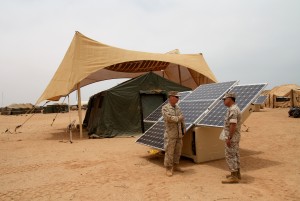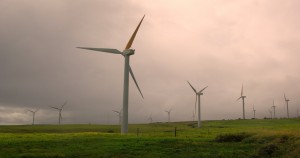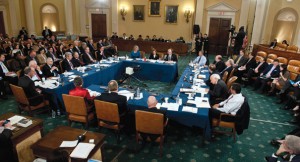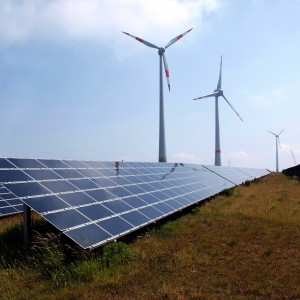587 item(s) were returned.
According to the Pentagon, the military’s reliance on fossil fuels – and the vulnerabilities that accompany that reliance – could potentially pose a major national security issue. This potential threat has invigorated the Department of Defense (DoD) to lead on the issue by rebalancing energy security throughout the military. Satisfying growing concern for both operational energy and installation energy looks to be a challenge in the years to come. Pentagon planners are responding accordingly by recognizing the critical role of energy in military operations and the potential vulnerabilities. The overarching mission is the preservation of operational capabilities at home and… [more]
View InsightPresident & CEO
The Electricity Consumers Resource Council
On June 10, 2016, Rep. Fred Upton (R-MI), Chairman of the House Energy and Commerce Committee and Rep. Ed Whitfield (R-KY), Energy and Power Subcommittee Chairman, sent a letter to the Federal Energy Regulatory Commission (FERC) regarding the state of organized wholesale electricity markets. This included questions on how federal and state energy subsidies affect organized markets and the jurisdictional “bright line” between state (retail) and federal (wholesale) authority. Deployment of new technologies, regulations, and subsidies are affecting the outcomes and compositions of electricity markets. The Congressmen are exploring whether the Federal Power Act should be altered to help markets… [more]
View InsightAssistant Director
University of Texas Energy Institute
The world has experienced profound changes recently regarding energy and the economy. Fossil fuels, while still abundant, are becoming more costly to develop as the most easily-accessible resources become depleted. Many renewable energy technologies are becoming less costly due in part to market forces as well as supportive state and federal energy policies. These technologies however would require massive capital investment to replace fossil fuels at current scale. Global demand for energy continues to climb while advanced economies are becoming less energy-intensive when measured per unit of GDP. Meanwhile, a global financial crisis as well as mounting public and private… [more]
View InsightUnited States Senator, State of Hawaii
Member, Senate Appropriations Committee
My legislation is based on a very simple idea. And that idea is that there ought to be a level playing field between fossil fuels and clean energy. Right now, fossil fuels subsidies in the tax code, for the most part, are permanent and the clean energy tax credits, for the most part, are temporary. Now, there is a good reason to make tax credits, subsidies, and incentives temporary in the tax code; from a policy standpoint, that requires legislators to reevaluate how a policy is working over time and to make modifications. But when you make a tax incentive… [more]
View InsightAssociate Professor of Sustainability Science and Policy
University of Vermont
Energy systems are in transition from predominantly centralized fossil-fuel and nuclear-based infrastructures to more efficient and heterogeneous renewable-based configurations that include a diversity of different kinds of decentralized, distributed energy. This energy transition is much more than a technological substitution; this transition also includes major social innovations including institutional and cultural changes related to expectations for how individuals, households, communities and organizations use and manage energy. The renewable energy transition also has huge potential to redistribute the political “power” associated with huge multi-national conventional energy companies. This political potential of the local, distributed, abundant, and renewable characteristics of renewable-based energy… [more]
View InsightIn May, the Environmental Protection Agency (EPA) released regulations designed to curb methane (CH4) emissions from new, modified and reconstructed oil and natural gas sources. As part of the Obama administration’s effort to combat climate change, the rule attempts to reduce methane emissions by as much as 45% from 2012 levels by 2025. According to the EPA, methane is the second most prevalent greenhouse gas emitted by humans on a pound for pound basis. Although the atmospheric lifetime of CH4 is much shorter than carbon dioxide (CO2), methane is at least 25 times more potent at trapping heat in the… [more]
View InsightThe Senate recently passed the bipartisan Energy Policy Modernization Act (S.2012), co-authored by Senators Lisa Murkowski (R-AK) and Maria Cantwell (D-WA), by a vote of 85-12. In 2015, the House passed its own comprehensive energy efficiency bill, the North American Energy Security and Infrastructure Act of 2015 (H.R.8). The bills will shortly head to a Conference committee whose efforts to reconcile different language, in areas like energy efficiency, could face a difficult challenge. The White House strongly opposes H.R.8, stating that it “undermines successful initiatives designed to modernize the Nation’s energy infrastructure and increase our energy efficiency.” According to an… [more]
View InsightPresident
Reishus Consulting, LLC
The New York Attorney General has been investigating Exxon Mobil for failing to disclose to its investors its climate risk, or the risk that climate change may have on the value of the company’s assets, including its extensive oil reserves, which some claim must remain in the ground if necessary future reductions in carbon emissions are to be achieved. As the controversy around Exxon Mobil’s carbon-related financial reporting continues, other entities are moving forward to address so-called climate change or “carbon asset” risk. In fact, the institutional investment fund CalPERS now requires that companies it chooses to invest in have… [more]
View InsightProfessor of Physics
City College of the City University of New York
Encouraging energy R&D, substituting solar, wind, and safe nuclear energy for fossil fuels is a big plus for safeguarding the global environment. But it is also a vital step in fighting terrorism. For many decades, the Organization of Petroleum Exporting Countries, or OPEC as the international cartel is commonly known, successfully regulated world oil supplies and thereby the price of a barrel of oil on the international market. By doing so it filled the national treasuries of Saudi Arabia, Iran, Iraq, Venezuela and nine her nations across the globe, giving them an outsized role on the stage of world affairs,… [more]
View InsightThe Senate recently passed the bipartisan Energy Policy Modernization Act (S.2012) cosponsored by Senators Murkowski and Cantwell. One aspect of the bill that is creating controversy revolves around provisions characterizing biomass as a renewable, carbon-neutral energy source. This new, definitive characterization has sparked significant disagreement. Proponents argue that the carbon emitted is part of a closed-loop system through which plant regrowth captures CO2 emissions. The Biomass Thermal Energy Council expressed its support of the carbon-neutral designation in the legislation, indicating that the bill puts “clean, highly efficient energy from biomass on a better footing to contribute to our country’s renewable… [more]
View Insight








